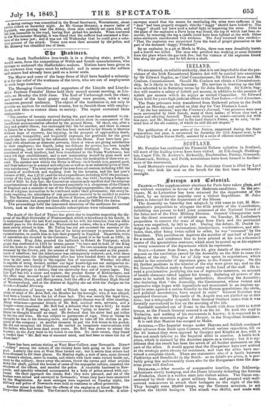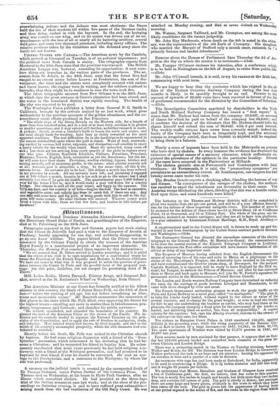fforeign anb Colonial.
FizurcE.—The supplementary elections for Paris have taken Oniteselld are without exception in favour of the Moderate-madidates. a the pro- vinces, M. de Lamartine has been returned for the department of the Lcdret, by an immence majority over a violent Republican. M. Jules Favre is returned for the department of the Rhone. ' The Assembly on Saturday last adopted, by 332 votes to 148, M. Mon- talembert's proposition to abrogate the 67th artiole of the Constitution, forbidding one person to hold joint command of the National Guard of the Seine and of the First Military Division. General Changarrnier now has the direct command of 600,000 men. On Tuesday, M. Laclodure's proposition to remove the state of siege from Paris and the provincial towns was negatived, by 363 to 141. During the debate, M. Ducliti in- dulged in such violent exclamations, interjections, vociferations, and atti- tudes, that, after being twice called to order, he was " censured " by the President. This punishment deprives the member of one-half of his pay for a month, and condemns him to have printed at his cost a thousand copies of the ignominious sentence, which must be posted up at his expense in every commune of the department which he represents.
aux.—Letters from Rome, to the 3d, give details of the events con- sequent on the resolution passed by the Assembly on the 30th to cease the defence of the city. The 1st of July was spent in negotiations, which ended in the surrender of important gates to the French troops. On the 2d, further positions in the interior of the city were given up; and on the 3d, General Oudinot made a formal entry at the head of the staff. He is- sued a proclamation justifying the use of repressive measures, on account of hostile clamours raised against his troops; declaring all powers of the state to be united in the military authorities; dissolving the Assembly; also declaring that "the Assembly, the Government, whose violent and oppressive reign began with ingratitude and terminated in an impious ap- peal to arms against a nation friendly to the Roman populations, the clubs, and political associations, have ceased to exist." General Rostolan was appointed Governor. The castle of St. Angelo was not yielded up at this time; but a telegraphic despatch from General Oudinot states that it was formally surrendered to him on the morning of the 5th. Garibaldi marched out of Rome to the South with from 3,000 to 4,000 troops, as the French General entered it on the 3d. He took the road to Terracina, and nothing of his movements is known : it is supposed he is making for the mountain region of Abruzzi, in the Neapolitan dominions.
It is said that Mazzini has escaped to Malta.
Ansrma.—The Imperial troops under Haynau and Schlick continued their advance from Raab upon Comets), without serious opposition, till on the 2d instant they were opposed by Georgey and Klapka at Aes, with a force not much inferior to the Imperial allies in number. A battle took place, which is claimed by the Austrian papers as a victory; but it is sig- nificant that the result has been the arrest of all further movement on the part of the allies. It would appear that the Hungarians have now arrived at the strategic point chosen for resistance, and that the allies have sus- tained a complete check. There are statements also of a battle between Paskievicz and Dembinski in the North: as no details are given, it is pro- bably going less unfavourably there also for the Hungarians than the Atte- trian press will disclose. Dexatuts..—Afeer months of comparative inaction the Schleswig- Holsteiners slowly besieging, and the Danes leisurely defending the fortress of Frederica, there is a sudden start into violent action. The Danes con- centrated by their ships a great military force, and prepared with well- covered manceavres to attack their besiegers on the night of the 6th. They brought some 20,000 troops, say the German accounts, to act against the 16,000 besiegers. The attack was skilful, and made with Overwhelming ardour; and the defence was most obstinate: the Danes held the fire of their muskets till within five paces of the German ranks, and then firing, rushed in with the bayonet. In the end, the besieging army was routed on one wing, and on its centre was driven out of its en- trenchments with the loss of all or nearly all its battering-artillery, several field-guns, and some two thousand prisoners, including thirty officers. The relative positions taken by the victorious and the defeated army since the battle are not known.
UNITED STATES AND CANADA.—The American news by the Cambria, which arrived at Liverpool on Tuesday, is of no political importance; and the political news from Canada is scanty. The telegraphic reports from Montreal to the 25th June state that the province was tranquil. The British American League was, however, extending its organization: it now num- bers thirty-six branches in the various parts of the provinces. The ac- counts from St. John's, to the 29th June, state that the forest fires had ranged to an extent never before known: at Fredericton, the seat of Go- vernment, the river and the streets were completely covered with embers and burnt leaves; the engines were in waiting, and the soldiers confined to barracks, that they might be in readiness in case the town took fire.
The latest telegraphic account from New Orleans is to the 26th June; at which date the great crevasse at Sanve's plantation had been closed, and the water in the inundated district was rapidly receding. The health of the city was reported to be good. The Washington Union publishes a letter from General P. G. Smith in California, brought by the arrivals noticed by us last week, which gives authenticity to the previous accounts of the golden abundance, and the ex- traordinary social effects produced at San Francisco. " The whole slope of the Sierra Nevada on the Western side, for a length of more than four hundred miles, and in a belt of at least forty, contains it in greater or smaller quantities; and it may extend still further, as further research is made. A pickaxe, shovel, or even a butcher's knife to loosefl the earth and stones, and the most simple basin for washing, have been as richly rewarded as the most approved machines. The real difficulties lie in the hardships to be encountered in the remote uninhabited spots where the gold is found. Want of food, overwork- ing excited by success, bad water, exposure, and dissipation—all combine to exact a heavy tribute for the wealth when found. Many die unheeded, many come off sick; but there are ten arriving from every quarter of the globe to replace every one who goes. Chinese, Sandwich Islanders, Chilians, Peruvians, Prussians, Mexicans, French, English, Irish, outnumber as yet the Americans; but the lat- ter will soon have their share. Provisions, woollen clothing, liquors, kitchen and mining utensils, sell at enormous profits in the mines: other articles scarcely sell at all; woman's gear is altogether a drug. In the mean time, all this is dis- astrous for us. No servants are to be had: 250 dollars a month has been refused in my presence by a cook. All my servants have left, and yesterday I engaged one at 100 dollars a month, because he is too sick to go to the mines; but I shall certainly lose him if he gets his health. The quartermaster pays 5,000 dollars' a year for the house I live in, and it would make a poor toll-house for a country bridge. The climate is cold all the year round, and foggy in the summer. The bette,aec4re5 and the country is all hills—forOosaiseisull. The beef is execrable, and vegetables none; an& n&ley tazae -To catch fish if there are any. Any one who will come here and dig gold, or Laing goods with him to sell to the dig- gers, will make money. No other business will succeed. Whoever comes must bring a house with him; there are but few here, and lumber is 600 dollars per thousand."



























 Previous page
Previous page